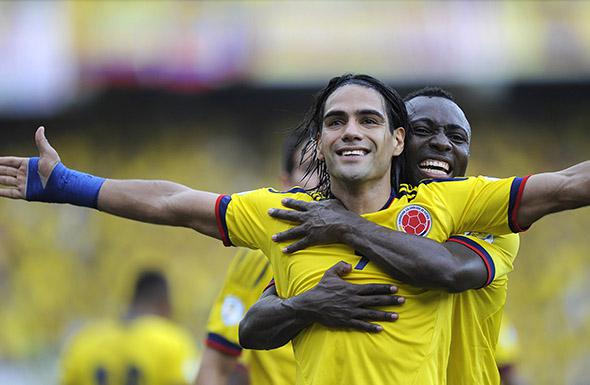Soccer in Colombia is as hegemonic as its Catholicism, and as culturally significant as its magical realism or its guerrillas. During the narcoterrorism of the ’90s that shocked the country to its core, a time when we Colombians didn’t have much to be proud of, soccer was the shining exception.
That was the era of the “golden generation,” the team of Carlos “El Pibe” Valderrama with his distinctive golden locks, of René Higuita, Leonel Álvarez, Adolfo “El Tren” Valencia, Faustino “El Tino” Asprilla, and Freddy Rincón. The star-studded team of international renown headlined the TV commercials of my childhood and were the cultural idols of my generation. They also performed their share of historic feats. Higuita invented the amazing scorpion kick, and in 1993 they beat Argentina 5–0, in Argentina, a day that’s celebrated in Colombia as practically a national holiday.
And then it all came crashing down at the 1994 World Cup. In that tournament, the Colombians lost to the U.S., in part because of the ill-fated own goal of Andres Escobar that resulted in his murder, the lowest point in Colombian soccer and the beginning of the end of the golden era.
In the 2000s, the country’s political and soccer fortunes reversed. Leftist guerrillas were subdued by the iron-fisted administration of president Álvaro Uribe Vélez, the economy recovered, and La Selección, as the national team is known, became a source of frustration and shame for Colombians. They failed to qualify for the World Cup in 2002, 2006, and 2010, consistently disappointing a fervent and incredulous fan base.
Now, for the first time in 16 years, Colombia is going to the World Cup, and in a country as devoted to soccer as is Brazil or Argentina, it’s a huge deal. But it’s marked by tragedy and drama: Radamel Falcao, one of the best strikers in the world, suffered a knee injury this January and won’t be playing in Brazil, making Colombia’s prospects uncertain.
Many consider Falcao—who was a finalist for the Ballon d’Or in 2012 and plays for Monaco in France’s Ligue 1—to be at the same level as Cristiano Ronaldo and Lionel Messi. Falcao isn’t just a great player. He has also helped transform the Colombian team with his cheery disposition and devotion to hard work. After his injury, and faced with the prospect of missing the World Cup, an event he had worked for his whole life, he remained determined to recover up to the last minute.
Fortunately for Colombians, Falcao is not as essential to his team as Ronaldo is for Portugal or Messi for Argentina. Coach José Pékerman’s style brings out the players’ individual strengths while maintaining group cohesiveness, allowing for the freewheeling, highly entertaining, improvisational style that characterizes this team.
Pékerman came on as manager in the middle of the qualifying rounds, replacing Leonel Álvarez of golden-generation fame. The team’s ascent under Pékerman has been dramatic: They went from being ranked No. 54 by FIFA in June 2011 to No. 3 in August 2013, a remarkable improvement in a short amount of time.
Read all of Slate’s World Cup 2014 coverage.
*Correction, June 14, 2014: This post originally misstated Colombia’s first World Cup opponent. It is Greece, not Ivory Coast.
